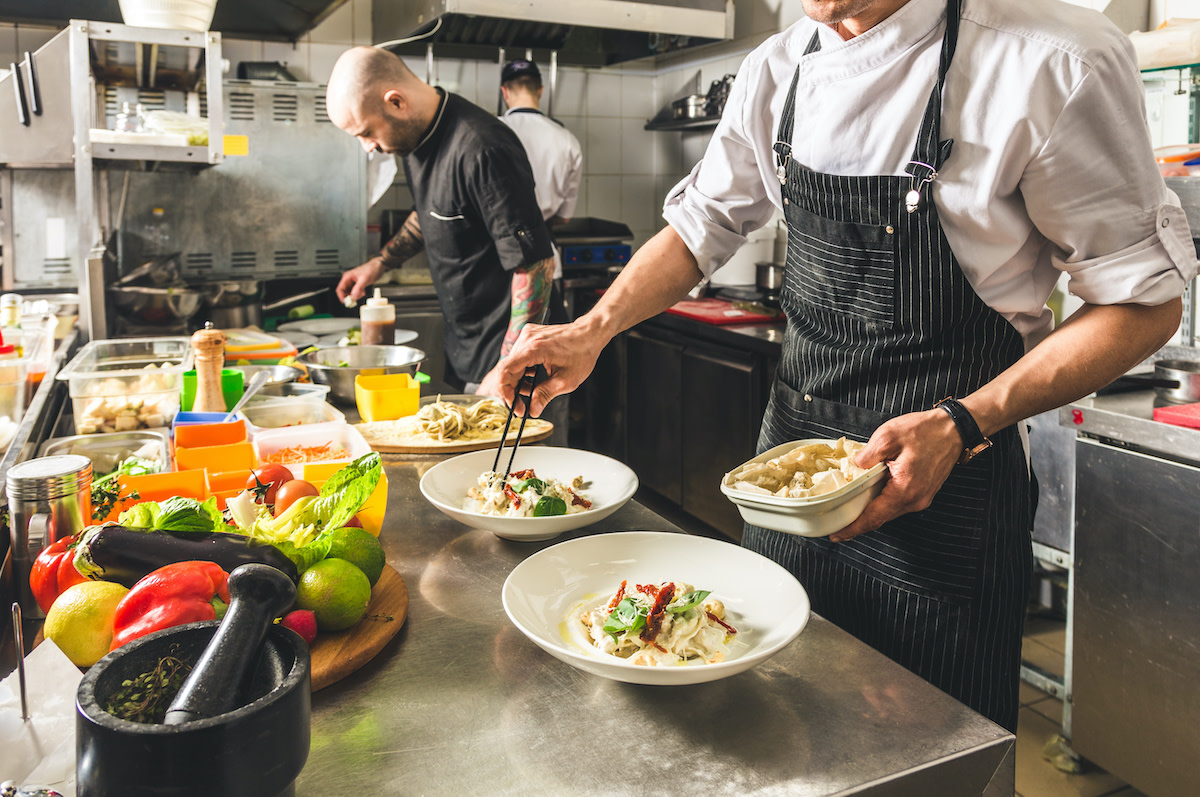Learn From the Best
What Do You Need to Open a Restaurant?
To get your own restaurant off the ground, you’ll need access to capital, the right permits, and a strong business plan.
- Access to capital: Your initial expenses will vary depending on the type of restaurant concept you are pursuing, but in general, the restaurant business is notorious for its thin profit margins and sizable startup costs. Restaurant owners do not necessarily need to dip into personal savings to get their new restaurant started, but they do need a reliable source of capital. This can look like a small business loan, a working capital loan, a line of credit from a bank, credit card debt, or investment partners. Small business owners opening their first restaurant may have a harder time accessing capital than established restaurateurs. The Small Business Administration (SBA) may be a resource for helping your new business meet its startup costs.
- Proper certifications and paperwork: Register your new business venture with the IRS and your state's applicable governing bodies—including its employment office. As a food business, you will need to register with the health department, which will inspect your kitchen before opening day and throughout the life of your restaurant. You will also need liability insurance that includes workers’ compensation to protect you from lawsuits. You will need a certificate of occupancy, whether you are running a full-service dining room or a quick-service restaurant. Finally, you will need to apply for a liquor license if you intend to serve alcohol. The National Restaurant Association is a business association that can help you navigate some of these certifications.
- A restaurant business plan: All types of restaurants need a business plan. A proper business plan will identify your target market, outline your business needs, and describe the type of dining experience you seek to provide your target audience. The business plan will inform further planning documents such as a marketing plan and staff flow chart.
How to Start a Restaurant
Much of your first year as a restaurant owner will involve planning, purchasing, leasing, staffing, and certifying—all of which occur before opening day.
- 1. Pick a restaurant concept. Choose the type of restaurant that will inspire you to put in hard work every single day. Whether you dream of running a pizzeria, a steakhouse, a fast food joint, a fine dining restaurant, a casual eatery, or a food truck, you'll need to pick a cuisine and a dining experience that you find inspiring.
- 2. Develop your restaurant business plan. Your business plan will be your guidebook for operating your new restaurant. This is also a good time to develop your marketing strategy. Once you establish your business model, commit to it.
- 3. Seek funding. Unless you have enough cash on hand to start a restaurant on your own, you’ll need to seek funding. Use your business plan to back up your pitch when you approach banks, commercial lenders, and potential business partners to explain your restaurant concept.
- 4. Lease real estate. Unless you already have a real estate portfolio, you will probably have to lease your restaurant space. Choose a restaurant location that is zoned for food service, has adequate parking or access to public transit, has enough space for restaurant equipment, and ideally can attract foot traffic.
- 5. Invest in equipment. Most municipalities have restaurant equipment stores where you can buy or lease your most important pieces of cooking equipment. Some restaurant spaces include equipment in the lease. You will also need dining room supplies. This includes tables, chairs, dishes, silverware, cash registers, point of sale credit card readers, and decorations to set the proper ambiance.
- 6. Identify suppliers. A restaurant needs reliable suppliers for all the items it sells. You or your chef will need to make connections with produce vendors, butchers, fishmongers, and beverage and alcohol distributors, depending on your business model.
- 7. Hire staff. Successful restaurant management starts with hiring the right people. Most restaurants begin their hiring process with an executive chef who establishes the menu items and supervises the hiring of other kitchen staff. Nearly as important are front-of-house staff, who represent the public face to your customers. Depending on your restaurant's service style, you may hire servers, bussers, bartenders, or cashiers. Hiring the right back-of-house support staff—such as dishwashers and sanitation specialists—is just as important.
- 8. Get the word out. Execute your marketing strategy to reach prospective customers and hold onto them. If you have room in your budget for a publicist, hire one to build awareness and get professional critics to review your restaurant. Advertise on search engines and social media sites, which often provide tools to inform your market research. As people begin to visit your restaurant, word of mouth will spread. In many ways, this remains the most effective way to get new customers to try your restaurant.
- 9. Work hard every single day. It takes an immense amount of hard work to get your restaurant to its grand opening, but in many ways, your journey is just beginning. Restaurants have many moving parts and each new day can bring a new challenge—from staffing and food costs to food safety and bad reviews. The most successful restaurant owners are resourceful and think on their feet so that one incident is never enough to derail their restaurant's success. If you love what you do, this hard work will be its own reward, so pick a restaurant concept that truly elicits your passion.
Want to Learn More About Cooking?
Become a better chef with the MasterClass Annual Membership. Gain access to exclusive video lessons taught by the world’s best, including Gordon Ramsay, Gabriela Cámara, Chef Thomas Keller, Dominique Ansel, Yotam Ottolenghi, Alice Waters, and more.
